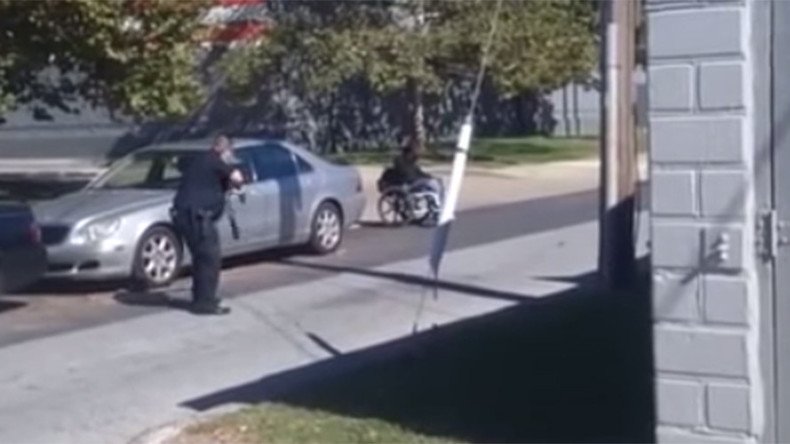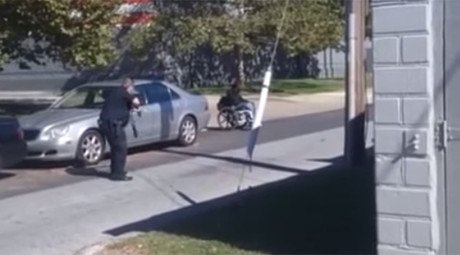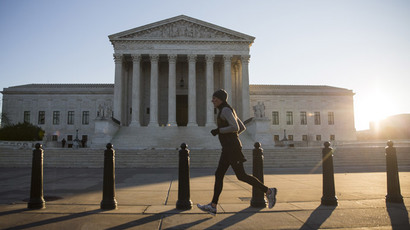No civil rights charges for Delaware cops who fatally shot paralyzed man

Police corporals of the Wilmington Police Department who fatally shot an already-wounded, wheelchair-bound African-American man in September 2015 will not be charged with violating the man's civil rights, federal prosecutors with the US Attorney's Office for the District of Delaware have announced.
On Friday, federal officials with the US Attorney's Office for the District of Delaware, the FBI, and the US Justice Department's civil rights division told the family of Jeremy McDole, the man killed by Wilmington police, that evidence does not indicate the officers willfully used excessive force in shooting McDole.
"The Justice Department announced today that there is insufficient evidence to pursue federal criminal civil rights charges against the Wilmington Police Department (WPD) Corporals involved in the fatal shooting of 28-year-old paraplegic Jeremy McDole on Sept. 23, 2015," the US attorney's office said in a release, according to the News Journal.
The encounter between police and McDole, 28, was caught on cellphone video by a witness, eliciting outrage in Wilmington and beyond. Police arrived on the scene after a 911 call claiming an African-American man in a wheelchair was suffering from a self-inflicted gunshot wound. In a lawsuit filed against the city of Wilmington, McDole's family said that McDole was robbed of his wallet and then shot, and that the thief or an accomplice called police claiming a self-inflicted gunshot was to blame for McDole's condition.
Three white police officers and one Hispanic officer — Senior Cpl. Joseph Dellose, Senior Cpl. Danny Silva, Cpl. Thomas Lynch and Cpl. James MacColl — approached McDole; one officer pointed a shotgun or rifle at him, yelling at McDole to "drop the gun" and to put his "hands up." The video shows McDole rubbing his knees with both hands.
As McDole moved his hand toward his waist, Dellose shot him several times, as McDole fell sideways to the ground. Dellose had fired about two seconds after first calling on McDole to put his hands up, according to a report by the state attorney general, creating confusion among other officers.
The office of Delaware Attorney General Matt Denn eventually cleared the officers in the shooting, but said Dellose exhibited "extraordinarily poor police work" during the encounter with McDole. The office recommended Dellose should no longer be employed by Wilmington police in a role that requires carrying a firearm in public.
Federal prosecutors decided against filing a felony assault charge against Dellose, according to The News Journal, given state law allows law enforcement officers to use deadly force if they believe they are endangered in a given situation.
McDole, who had a lengthy criminal record and was paralyzed during a 2005 shooting, was found to have a .38 caliber revolver on him during the incident, according to the investigation, with his DNA on the gun and both spent casings and live rounds in his underwear. The investigation of the shooting found gunshot residue on McDole's right hand and clothing, the US attorney's office said Friday. No weapon is visible in the witness video.
Toxicology tests found evidence of PCP in McDole's bloodstream, according to the state law enforcement's investigation, which also determined that the gun found on McDole was reported stolen. The state attorney general's report cited an unnamed person who said that on the morning of the shooting, he had wheeled McDole to a section of Wilmington where he could get a gun and cigarettes laced with PCP.
Last month, the city of Wilmington agreed to settle the family's lawsuit for $1.5 million. A federal judge is scheduled to decide whether to approve the settlement next week, according to reports. The settlement would demand the Wilmington Police Department reconsider its use-of-force policies and to train its officer in deescalation tactics, especially when confronting physically or mentally disabled persons, the News Journal reported.
McDole's family had argued that the officers never identified themselves, nor did they attempt to use non-lethal means on McDole.
"They said they left no stone unturned.... There simply wasn't enough evidence there to sustain a criminal charge," said family attorney Thomas Neuberger, according to AP. He added that the family is "very disappointed" by the decision.
In March, the Pittsburgh Tribune-Review reported that federal prosecutors chose not to bring charges against officers alleged to have committed civil rights violations in 96 percent of cases form 1995 to 2015, mostly based on reasons that included weak or insufficient evidence, a lack of clear intent to infringe on another person's civil rights, and discouragement from the Department of Justice.
















